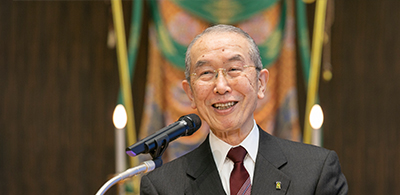Living Our Daily Lives as Expected—Diligence, Part 1
July 2022

What Is Diligence?
I often say, “Diligent, diligent, until I die, I must be diligent. And if I receive another lifetime, I must be diligent again.” For a human being, there is no such thing as being perfect, so I admonish myself with these words, which remind me of my aspiration to make progress and improve myself.
However, if you simply hear this without understanding the meaning of diligence, you may feel that extraordinary resolution is required in order to practice diligence. Some people may suppose they are unable to practice diligence and shrink back from it.
Well, then, what exactly does diligence refer to?
In Buddhism, diligence is defined as “single-mindedly applying oneself to practicing and perfecting the Buddha Way.” Zen master Dogen (1200–1253) said that diligence is “never ceasing in one’s efforts to wholeheartedly perform various good deeds for the sake of other people” At the same time, “never ceasing” also sounds nearly impossible to do.
This reminds me of Founder Niwano’s words: “I hope we are all people who can naturally do what is expected of us.” For we lay Buddhists, that means never ceasing to live our daily lives with the attitude that at any time and in any place, “this is the place of the Way.” And in that case, diligence is not so much a practice of relentlessly driving yourself onward but rather, of being considerate of others in the course of your daily life and being mindful of speaking and acting in ways that will give those around you peace of mind. In other words, it is nothing more than living an ordinary life and doing what is expected of you as a person of faith.
The Buddhist scholar Shobun Kubota (1896–1986) used the expression “reading the Lotus Sutra twenty-four hours a day” to express the importance of “reading the teachings of the Buddha with our whole being,” while also showing us what a blessing it is to be able to put them into practice by living the Dharma in the course of our daily lives. Therefore, diligence is precisely what we are expected to do, naturally, as we live one day after another.
Awakening and Diligence Are One and the Same
To cite a well-known anecdote, when the visually impaired Aniruddha was patching his robe, he muttered, “Could someone thread the needle for me?” and Shakyamuni replied, “Yes, I will, as you will help me accumulate merits,” and threaded the needle for him.
Seeing that his disciple was filled with surprise and awe by the words and actions of his teacher, who had already attained the highest level of awakening, Shakyamuni said, “Aniruddha, there is no limit to how much consideration we can show to other people and I, more than anyone, seek happiness.” He gently explained to Aniruddha that regardless of one’s standing or degree of learning, there is happiness in perfecting one’s mind through the practice of benefitting others, and that continuing to do so is diligence.
This anecdote, like the aphorism “Practice and awakening are one,” shows us that being able to perform faith-based practices is proof of awakening, and in awakening there is the joy of diligence. Rather than seeing diligence as the means of awakening, I feel the joy of the faith in interpreting diligence to mean that every time we practice benefitting others, we are shining forth our buddha nature and, at the same time, deepening our awareness of our own buddha nature.
However, even though we know the importance of practicing what is expected of us as people of faith, at times we are unable to do so, defeated by our self-centered desires or a lazy mind.
At such times, the thought “this won’t do” crosses many people’s minds, doesn’t it? If you have this thought, even for a moment, that’s fine. Your mind cannot reset what it does not have, but you can go back to what you do already possess as soon as the opportunity presents itself.
The switch that resets the lazy mind to the diligent mind is the self-reflection of saying “this won’t do,” and the moment that your mind reaches that thought, it should return to the true, original mind of self-improvement, just like when you first aspired to live your life according to the teachings of the Buddha.
In that sense as well, the aspiration to vow to lead such a life is important. Our daily diligence and practices of benefitting others, which are supported by that aspiration, will eventually lead to world peace.



